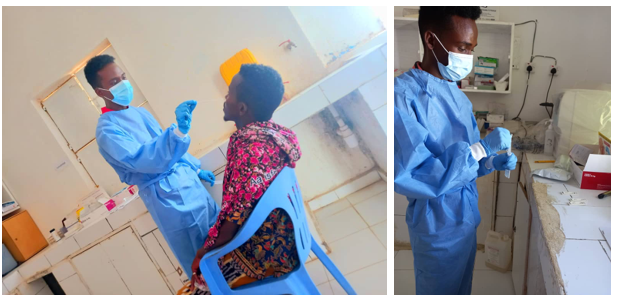 A laboratory technician collects a nasopharyngeal swab sample, then performs COVID-19 testing using Ag-RDT in rural health facility for Ag-RDT testing, Rako district, Karkaar region, referral health centre
A laboratory technician collects a nasopharyngeal swab sample, then performs COVID-19 testing using Ag-RDT in rural health facility for Ag-RDT testing, Rako district, Karkaar region, referral health centre
 Collection of nasopharyngeal swab sample, South West State, Somalia
Collection of nasopharyngeal swab sample, South West State, Somalia
7 December 2021 - As emphasized by the World Health Organization (WHO), testing is one of the key strategies to better understand and monitor the spread and trends of the transmission of SARS-COV-2 virus, which helps in timely detection of cases in order to mount an effective response. When the first case of COVID-19 was detected on 16 March 2020 in Somalia, the country had no testing capacities for SARS-COV-2. Instead, samples collected from suspected cases of COVID-19 in remote and hard-to-reach locations had to be shipped to the Kenya Medical Research Institute (KEMRI) in Nairobi, where 350 such samples were tested between March and April 2020.
To overcome this critical public health gap in the face of a global pandemic, Somalia was able to develop, equip and operationalize 3 molecular testing facilities – one each in Mogadishu, Garowe and Hargeisa – with support from WHO and other partners in record time. However, although this was a key step forward in building national testing capabilities, these laboratories were unable to meet the demand of the entire country for testing and samples collected from hard-to-reach areas still had to be shipped and transported to these 3 laboratories for testing – a process that would take on average 3 to 4 days. This is precisely why the introduction of antigen-based rapid diagnostic tests (Ag-RDT) across Somalia has been a game-changer for COVID-19 testing, detection and response in the country.
In Somalia, Ag-RDT has become key for point-of-care COVID-19 testing due to faster test results (i.e. 15-30 minutes), as well as there being no need for laboratory infrastructure or expensive equipment, which is beneficial in a country with limited resources. Moreover, the enhanced timeliness of diagnosis has enabled better decision-making for managing the spread COVID-19. It is in this regard that the WHO country office for Somalia joined hands with the Foundation for Innovative New Diagnostics (FIND) and the Federal Ministry of Health and Human Services to focus on the use and rapid rollout of the Ag-RDT in Somalia.
As part of this initiative, WHO, FIND and the Federal Ministry of Health and Human Services fixated on a number of important activities, including to: develop the testing protocol and training package for the use of Ag-RDT; develop a National Testing Strategy for COVID-19; and receive 41 250 Ag-RDT kits, donated by FIND to Somalia. With regard to the protocol and training package, both have been tailored to suit the country context and are geared towards training health workers, laboratory technicians and surveillance officers on: sample collection from suspected cases; testing; biosafety procedures during sample collection; disposal of hazardous materials; interpretation of the results and reporting; tools for collection; and criteria for eligibility of suspected cases for Ag-RDT testing. As of November 2021, a total of 133 (49 female, 84 male) health professionals from Somaliland, Puntland, Galmudug, Hirshabelle, South West, Banadir and Jubaland have been trained on how to use Ag-RDT.
Amal Hassan Mohamed, a laboratory specialist and microbiologist working at the National Public Health Laboratory based in Mogadishu, was one of the health professionals trained in the use of Ag-RDT under this project. Originally from Heliwaa, Amal said, “The training helped me to enrich my skills. On average, I run around 30–40 tests a day. Thanks to the training, I am more confident with using Ag-RDT tests and I know that many health professionals are also more confident now.”
To complement the above, a National Testing Strategy for COVID-19 is also being developed, which will define the priorities for establishing, expanding and ensuring high-quality laboratory testing for the diagnosis of COVID-19 across Somalia at national, state and regional levels.
In terms of the Ag-RDT kits that were donated by FIND, reports from the field already confirm considerable improvement in access to COVID-19 testing in remote areas and at points-of-care across Somalia, where access to PCR (polymerase chain reaction) testing is limited or non-existent. So far, 31 471 samples have been tested using Ag-RDT of which 3111 were confirmed positive (positivity rate of 10%), which means that Ag-RDT has already contributed to the detection of one fifth (i.e. 20%) of all confirmed COVID-19 cases across the country. It is clear from this initial data that the roll out and use of Ag-RDT across all health facilities and districts in Somalia could further improve access to testing, which would ultimately contribute to early detection of existing and new variants of COVID-19, as well as the need for isolating and following up on confirmed cases at the point-of-care. By reaching remote locations and populations, Somalia is also advancing towards one of its national goals to ensure no one is left behind in accessing health services.
The WHO country office for Somalia expresses its sincere appreciation to FIND for this important contribution, which has already shown positive results with respect to Somalia’s response to the COVID-19 pandemic.








